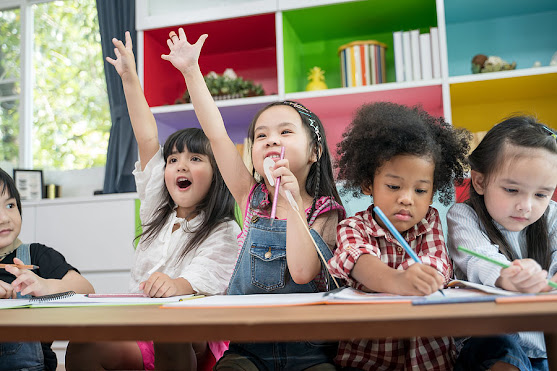If you are curious whether your child is attending an authentic Montessori daycare, there are some obvious traits you can look for. While any school can legally call itself a Montessori daycare, only authentic Montessori environments will adhere to the qualities listed below.
Child-Centered Learning
Montessori daycare focuses everything around the children. Pictures and decorations are hung at the child's perspective, the furniture is built for child-sized bodies, and children have the freedom to move about from workstation to workstation. The Montessori classroom is called a children's house because everything is designed to be more inclusive of children.
Montessori daycare focuses everything around the children. Pictures and decorations are hung at the child's perspective, the furniture is built for child-sized bodies, and children have the freedom to move about from workstation to workstation. The Montessori classroom is called a children's house because everything is designed to be more inclusive of children.
Authentic Materials
Montessori learning materials are sturdy and designed to be self-correcting. Montessori activities such as the Pink Tower develop multiple skills at once, such as building fine motor skills, introducing basic math concepts, and providing children with an engaging and interesting hands-on experience that improves retention and promotes an interest in learning.
Uninterrupted Work Periods
Montessori school kids do not move from room to room throughout the day. They remain in the same classroom for years, and the day is divided into 2-hour learning blocks to facilitate learning. The idea is to eliminate repeatedly stopping and starting work projects, allowing children to spend more time learning and less time going from place to place. And because kids remain with the same teacher throughout, teachers can get better acquainted with children and spend more time working with individual children.
Multi-Age Classrooms
Montessori uses a 3-year age group instead of all of the children being within a few months of the same age. This helps children learn at their own pace, removes the stigma related to always being the youngest or oldest children, and helps build empathy and leadership skills. Because children are able to learn readily from their peers and every student gets a turn at being among both the youngest and oldest kids in class, multi-aged classrooms make it possible for kids to work together and let younger children learn from watching and working with the older ones.
Montessori-Trained Teachers
Montessori teachers undergo special training in the Montessori Method. They are trained to observe children and provide guidance and encouragement. Teacher retention is a trait of Montessori schools, and that benefits children by giving children a stable environment with familiar faces.
There are other important traits related to Montessori daycare, including spending more time outdoors, carefully prepared environments, and including a full spectrum of developmental activities that are individualized to better match different needs and goals.





